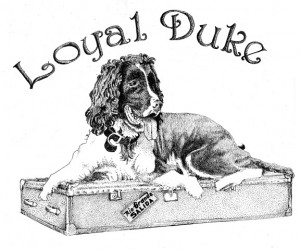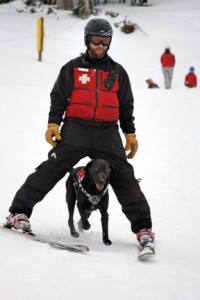by Laura Pintaine
Walk into any grocery store with a properly attired service dog puppy and eyes turn towards you. Reactions vary depending upon the customer. Some might consider, “what an admirable act to raise a dog for a disabled person,” while others might be thinking “I could never give up a puppy I’ve raised.” Others might just study you closely, trying to assess the disability you might have that warrants a service dog. Being judged by the public is just one of the trials and tribulation of being a Canine Partners of the Rockies, Inc. (CaPR) service dog puppy-raiser.
Service dogs are a type of assistance dog that serve people with disabilities other than those related to vision (guide dogs) or hearing (hearing dogs). Most people are familiar with guide dogs, which have been formally trained in the United States since some time after the end of World War I. The concept of training dogs for deaf and disabled people is more recent.
CaPR is a Colorado non-profit organization founded in 2002, by individuals who worked for other service dog organizations and saw a situation where too few dogs were being placed with Colorado residents. Recognizing the need for service dogs in the Rocky Mountain Region, the founders committed themselves to “raising, training, and placing highly skilled service dogs with mobility-limited Colorado residents to facilitate their greater independence with activities of daily living and to educate the public about the role assistance dogs play in the lives of people with disabilities.”
The role of a CaPR puppy raiser is to provide a safe, secure, nurturing, and enriched upbringing in order to maximize the dog’s potential to become a well-balanced, responsive, and highly skilled service dog. The puppies are raised in puppy-raiser homes from sometime after eight weeks until they are approximately 18 months and can be placed with an advanced trainer. After six months of advanced training, the dog does partnership training with a selected applicant for up to 100 hours. Even after graduation, CaPR teams are carefully monitored and are given support for the life of the partnership.
One particularly critical aspect of puppy raising is exposing the puppy to as many different people, animals, places, and noises as possible. This is one of the challenges with raising a service puppy in the Central Colorado area, as opposed to a big city such as Denver where an airport, elevators, malls and buses can easily be found. Also, since Denver is where CaPR is based, ongoing field trips and puppy classes specifically for service dogs are available there. Puppy raisers out of the Denver area are committed to routine visits there.
Chaffee County is particularly fortunate to have Carol Padlick, one of CaPR’s founding members, living in Salida. Carol, licensed as a certified pet dog trainer (CPDT), she has worked for several service dog organizations and is now serving as an advanced trainer/instructor for CaPR. During the advanced training, Carol refines basic obedience skills and teaches skills such as retrieving, tugging, operating light switches and elevator buttons, opening/closing doors, and pulling/walking next to wheelchairs.
Several residents of Chaffee County have raised dogs for CaPR and other assistance dog organizations, so seeing dogs dressed in capes, which identifying them as service dogs, is not uncommon in public places.
As a current puppy raiser, I am frequently asked about the difficulty of giving up a puppy I’ve raised. I have a variety of answers. I might explain that I keep in perspective from the beginning this is not truly MY puppy and that I’ll be giving it up. To someone else I might offer how having my own dogs makes it easier. To someone else I’ll describe the special experience of handing a trained dog over to someone whose life will be incredibly changed for the better. To those with children I might present the analogy of having a child go off to college or get married. The bottom line is that it makes no sense to me to avoid doing something uniquely rewarding because that experience will not be with me forever!
Laura Pintane lives in Salida and has had a passion for dogs her entire life. She currently owns a dog training business, works part time at a local veterinary hospital, volunteers for a PAWS for Reading program, is president of Salida Dog Club and sits on the board of Ark Valley Humane Society. She encourages residents and visitors of Salida to visit the newly opened dog park, Loyal Duke’s Dog Park.

